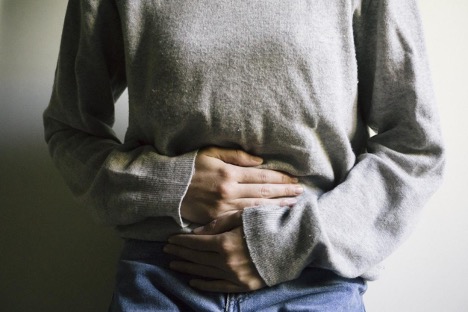– Diarrhea, often with blood or pus
– Abdominal pain and cramping
– Rectal pain
– Rectal bleeding
– Urgency to defecate
– Inability to defecate
– Weight loss
– Fatigue
– Fever
– In children, failure to grow

Even the words sound miserable.
It belongs to a group of conditions called inflammatory bowel disease (IBD). Affectionately known as UC, it causes irritation and ulcers (open sores) in the large intestine. It often causes diarrhea with blood, cramping and urgency. Sometimes these symptoms are so intense, it can wake a person up at night to go to the bathroom as well.
Abnormal immune response, genetics, microbiome, and environmental factors are all contributing factors to ulcerative colitis. Stress doesn’t help it either. Research implies that ulcerative colitis could be generated by an interaction between a virus or bacterial infection in the colon and the body’s immune response. A normal immune response would cause temporary inflammation to battle an illness or infection. The inflammation would then go away, once you are healthy and free of the illness. With UC patients, the inflammation persists, and the body continues to send white blood cells into the intestinal lining where they produce the inflammation and ulcers.
It usually begins in the rectum toward the end of the digestive tract and can spread and affect all or part of the colon. When these areas are affected, it is called Ulcerative Proctitis. If the entire large intestine is affected, it is called Pancolitis. If only the left side of the colon is affected, it is known as limited or Distal Colitis. Left-sided Colitis is when the Inflammation extends from the rectum up through the sigmoid and descending colon.
Everyone experiencing disease may have it a little different. The severity depends on how much inflammation and where that inflammation is located. You could have severe inflammation in the rectum (small area) or very mild inflammation in the entire colon (large area). Ulcerative colitis can be debilitating and may lead to life-threatening complications. While it has no known cure, treatment can reduce signs and symptoms of the disease and bring about long-term remission.
Signs and symptoms may include:
– Diarrhea, often with blood or pus
– Abdominal pain and cramping
– Rectal pain
– Rectal bleeding
– Urgency to defecate
– Inability to defecate
– Weight loss
– Fatigue
– Fever
– In children, failure to grow
© All Rights Reserved